
Charles Burchfield Bluebird and Cottonwoods (The Birches) �1917

My Australian friend Wayne Hall, who‘s lived in Athens for many many years, is doing a video project on fellow Aussie Julian Assange. This is an interview with me, recorded 3 weeks or so ago, that’s part of the project. I would have done 1000 things differently, but it’s not my baby, it’s Wayne’s world. At least some snippets of information come through.
Note: it was 100º, and it shows. Very sweaty, very uncomfortable. Still, while I’m not wild about doing videos -we had Nicole for that, right?!- maybe I should be doing more of this. Not that I watched this one, mind you. But you can.


Wayne Hall: Good afternoon Raúl Ilargi Meijer. You have a blog called “Automatic Earth” and you are very active with it. Can you say something about “Automatic Earth”? When was it founded? What is its aim?
Ilargi: It was founded almost eleven years ago. Nicole Foss and I founded it because we wanted to write about finance whereas the people we were writing for before that, “The Oil Drum”, didn’t want us to do that and we thought it was too important not to.
WH: And what are you doing here in Athens?
Ilargi: I’m supporting a group of people who feed the homeless and refugees. I’ve written a bunch of articles at “Automatic Earth” about that.
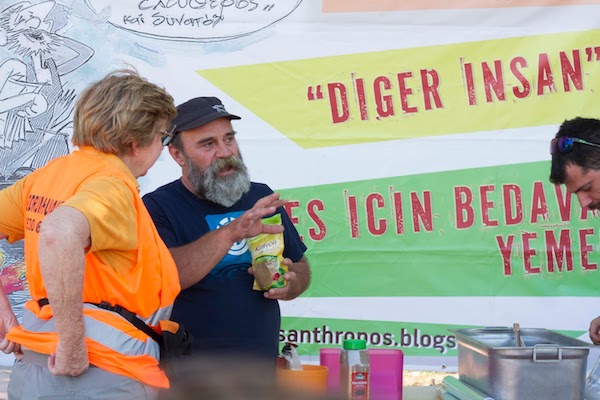
WH: Now even though you have written articles that show clearly how important you think it is to try to defend Julian Assange (I read one that you published today [17/8/2018] that was very much on that subject and it was a powerful article), you really don’t agree with Julian Assange on the importance of defending the European integration project or citizens’ Europe.
Ilargi: I have no idea what either of these things are.
(Note Ilargi: here Wayne leaves several lines untranslated. I said again that I don’t know what the European integration project or citizens’ Europe are. And of course I can’t disagree with Assange, or anyone else, on things I don’t even know exist.)
WH: Well, let’s move on. In an article entitled “I am Julian Assange” on 16th May 2018, you wrote: “Julian Assange appears to be painfully close to being unceremoniously thrown out of the Ecuadorian Embassy in London. If that happens, the consequences for journalism, for freedom of speech and for press freedom, will resound around the world for a very long time”. Would you like to say more about that?
Ilargi: I think there are not nearly enough people who realize what the consequences are going to be of Assange being thrown to the wolves.
WH: What will they be?
Ilargi: He stands for every journalist but he also stands for every citizen. He is the man who offered his freedom to give everybody else freedom..
WH: You say that he has the credibility he has because he has never published anything that is not 100% verifiable and true.
Ilargi: That is the basis of Wikileaks: it’s truth, honesty. Nobody would ever give him another document if they were in doubt that he would preserve secrecy, he would protect their identity or he would treat the documents in the best way possible.
WH: You also wrote: “People like Chelsea Manning, Kim Dotcom, Edward Snowden and Julian Assange are among the smartest people our world has to offer. We should be cherishing the combination of intelligence, courage and integrity they display at their own risk and peril, but instead we allow them to be harassed by our governments because they unveil inconvenient truths about them. And pretty soon there will be nobody left to tell these truths, or any truth at all.” That’s a very pessimistic assessment. Would you like to believe that it is too pessimistic?
Ilargi: Isn’t it more like realistic? How many people like Assange and Snowden or Chelsea Manning are there? We don’t have a never-ending supply of them.
WH: In your article “Julian Assange and the Dying of the Light” you wrote: “The ideal situation would be if Australia would offer Julian Assange safe passage back home. Assange has never been charged with anything, other than the UK’s bail-skipping change.” He has been charged with other things, but the charges have been withdrawn.
Ilargi: He has been charged with what?
WH: Wasn’t he charged with rape or something, in Sweden?
Ilargi: No, no..
WH: What was it? What happened there then if it was not a charge?
Ilargi: They said they wanted to talk to him. That was very strange. From what I know of the story the prosecutor let him go. Told him he was free to go to Britain and then – I don’t know if it was the same prosecutor, Marianne Ny, but anyway the Swedish justice system did a 180 and as soon as he got to London they said that he had to go back because they wanted to talk to him again.
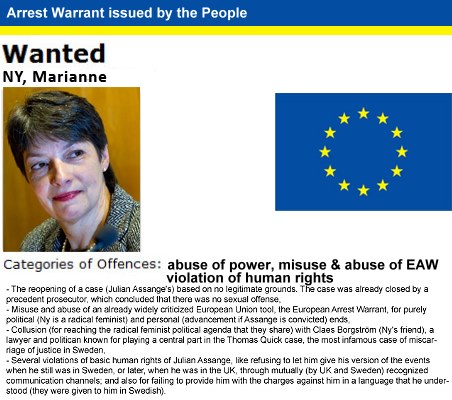
WH: Merry-go-round.
Ilargi: But neither of the two women involved ever filed any charges against him, or any complaint. They even went out of their way, albeit far too late, to say “He didn’t rape me. It never happened.” It seems .. That was a smear thing. And it’s been very successful..
WH: It seems so. Talking about Australia again, and safe passage back home, it’s true that years ago the Australian government acknowledged that it had responsibilities to help and protect Australian citizen Julian Assange. For example in 2001 Australian Prime Minister Julia Gillard said:
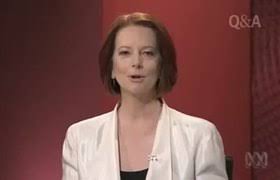
“We are supporting Julian Assange the same way that we would support any Australian citizen who got into a legal difficulty overseas.”
But for years after that, these responsibilities seem to have been forgotten. Even supporters of Julian Assange seem to assume that it is OK for the Australian government to allow Ecuador, a weaker, poorer and more vulnerable country than Australia to take responsibilities that the Australian government had said that it was taking but it seems simply was not. .
Ilargi: Who wrote that?
WH: Do you mean this comment about Australia and Ecuador? I wrote it.
Ilargi: OK. OK.
WH: Don’t you agree with it?
Ilargi: The Australian government has a very strange role in this. There is an older speech by the later PM Malcolm Turnbull that is being tossed around on Twitter in which he is very supportive of Assange.
WH: Is this a recent speech?
Ilargi: I think that was also from 2011 too. Apparently he no longer is.
WH: Next subject. Would you like to comment on the controversy Seth Rich versus the hacker Guccifer 2.0.
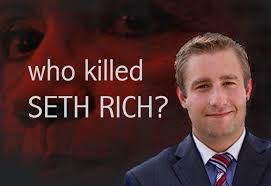
There seems to be a lot of misunderstanding and disagreement about this. I think a lot of people wouldn’t even know who Seth Rich was. Would you like to enlighten the people who don’t know?
Ilargi: From what I know Seth Rich worked for the Democratic National Committee. He was found murdered in Washington, not far from the White House. He is rumoured to be the guy who gave the DNC e-mails to Assange, to Wikileaks.
WH: This is something that Kim Dotcom apparently also says.
Ilargi: Yes. I don’t know enough about that but it seems obvious that the whole Guccifer 2.0 story is a fabrication. The US really really wants to make a link between Assange and Russia because it smears both. If they can make a connection between the two they will both look a lot worse.
WH: They’re trying hard.
Ilargi: And since neither can really defend themselves this narrative can be built and built. .
WH: Yes, that’s right. If you are dead or you re prevented from speaking, you can’t defend yourself.
Ilargi: No..
WH: At the moment I and a few other people are discussing two ideas in relation to Julian Assange. One of them is purely symbolic and it’s aimed at counteracting the media bias against Assange. That is the declaration of a Julian Assange Day. The day we propose is 26th January. We heard a few words from the mayor about the significance of January 26th in Greece in the context of Greece’s liberation from the Ottoman Empire.
But January 26th is also an important day in Australia. It is the national day. But many people are saying today that Australia s national day should be moved to another date, more inclusive of the many Australians who don’t feel that 26th January is suitable for the country’s national day. Let’s see what Amanda Stone has to say. In 2017 she was the mayor of the City of Yarra in Melbourne.
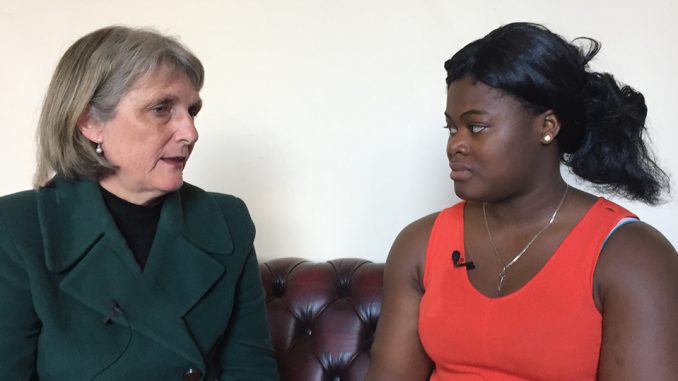
Amanda Stone: We ve been talking to the aboriginal community in Yarra for some time about the meaning of January 26th for them and we’ve heard from them that it is not a day of celebration. It is a day of sadness and loss for them. We ve been considering how we might address that to reflect those views. In February this year (2017) the Council resolved to ask the officers to consult with the aboriginal community about the future of January 26th, and that was also in the context of a growing momentum more broadly around the Change the Date campaign.
So we felt that it was an action whose time has come, that there would be broader support for it. And when the officers presented the results of the consultation with aboriginal people on Tuesday, that’s how we voted. But we’re not telling anyone what to do. We’re not changing the date of Australia Day as it is at the moment. We are not instructing people on how to spend January 26th. It will continue to be a public holiday, 26th January. People will still enjoy their barbecues and picnics and get-togethers in parks and gardens.
Lamourette Folly: Why is it important from your perspective as a mayor to change the date?
Amanda Stone: For me as mayor of the City of Yarra it is important that we are inclusive in what we do as a council. By holding celebratory events on January 26th we are actively excluding an important part of our community, the aboriginal community, who do not find it an occasion for celebration, who have told us so for many years, and are thoroughly supportive of the action we have taken. We want to be inclusive. We don’t want to exclude anybody.We want everyone to be able to celebrate our national identity and we need to find a date that we can do that on.
Lamourette Folly: That’s great. Do you have any date in mind?
Amanda Stone: No. I think it is something that needs to come out of a conversation. And I think lots of people have lots of ideas. And if we are going to be really inclusive we need to discuss it with everybody, not impose another date that might be contentious for another part of the people.
WH: If Julian Assange is freed it could very well be changed subsequently to Media Integrity Day, or something along those lines.
The second proposal is more concrete. It was initiated by the following posting by someone who calls himself “Realist” in the discussion that was started by Ray McGovern. What he said was this:
“If the American government thinks better of it and decides not to prosecute Mr. Assange (or perhaps offers him a plea bargain counting his time cloistered in the embassy against a short sentence), I wonder where he will choose and/or be allowed to live. Australia has abandoned him, and now Ecuador has betrayed him. He can’t trust any American vassal state in the EU, NATO or the “Five Eyes” (basically the Anglosphere). Would Putin allow him to run Wikileaks out of Russia? I suspect not. No free press throughout the Middle East, most of Africa and the “–stans” of Central Asia.
China is not looking to harbor a gadfly of the West. Latin America is spotty, though Glenn Greenwald makes his home base in Brazil despite the de facto coup against the Left there. How well are human rights protected in places like India or Malaysia? Singapore, Burma and Thailand are too authoritarian. Arthur C. Clarke decamped in Sri Lanka. Are there any truly sovereign nations in the Indian or Pacific oceans? Too bad New Gingrich didn’t get to establish his proposed Moon base. Julian might have managed Wikileaks from there, beyond the jurisdiction of any nation state on Earth.”
I said in response: “Realist’s” comments on Julian finding asylum on the Moon is frivolous, and if frivolous comments are permitted, why not outrageous comments? Are there Jewish people who would be outrageous enough to begin to lobby for Julian Assange to be given political asylum in Israel? Would he accept such an idea? Just the discussion of such an idea might be helpful in clearing some mental blocks.” ”
“Realist” replied: “Assange finding asylum on the Moon might be a frivolous comment but it underscores the paucity of venues that could pay the price to shield him against American wrath. In response to your invitation to discuss Israel as a plausible safe harbor for Assange, I should think his morals would preclude that possibility, even as a last resort. It would be repudiating everything he has stood for. As they say “tell me who your friends are and I’ll tell you who you are.”
Ilargi: That’s a very long way of saying “there are no options”. You don’t have to go through all the options to arrive at the conclusion that there are no options.
WH: So in other words…
Ilargi: A new country that is brought to the front in the past few days is Mexico. .
WH: Mexico.
Ilargi: Yes. People think that Lopez Obrador might be the guy to turn to. I suggested Iceland.
WH: I remember that. . .
Ilargi: They are independent enough to pull off something like that. Though I have no idea what the Icelandic government feels or thinks about Assange. But they’re independent. They’re the only country that locked up a bunch of bankers and told the creditors to go take a hike.
WH: I think what “Realist” would say is that these countries are not strong enough to protect Assange and that the CIA, or whoever is after him, would get at him.
Ilargi: Iceland has got a big moat. That is natural protection. .
WH: A big moat!
Ilargi: Yes. Of course there is no country that could give 100% protection to someone like Assange.
WH: There was a similar discussion in response to an article by Caitlin Johnstone.” “As long as Assange is silenced, claims against him are illegitimate”.
In any case, a campaign is under way. The ideas we are discussing here are not part of the campaign and I don’t want to impose them. The campaign is following its own logic.
Ilargi: There are no ideas. There is just a long list of “no options”.
WH: Yes, as you said. Right. This is continuing the discussion we had with the mayor.
Ilargi: I would like to add what we were saying before we started. The news about Assange’s health is not good. He has severe toothaches. His legs are swelling and his bone density is falling fast because of the lack of exposure to sunlight. So in the end, what it comes down to: Ecuador doesn’t even have to kick him out. They’re counting on the fact that he’ll have to walk out. .
WH: Yes, if he can. .
Ilargi: Or be carried out, on a stretcher. Or in a coffin. .

Julian Assange: (Trafalgar Square, London – 8th October 2011)
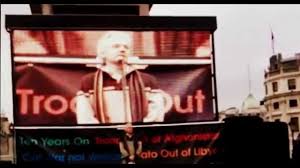
When we understand that wars come about as a result of lies peddled to the British public and the American public and the publics all over Europe and other countries, then who are the war criminals? It is not just leaders. It is not just soldiers. It is journalists. Journalists are war criminals. … If wars can be started by lies, peace can be started by truth.








